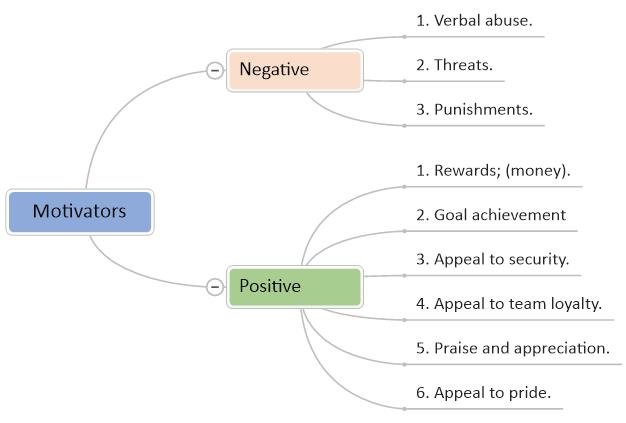
There are two types of motivator
Positive motivators and Negative motivators.
In the short term, both types will motivate your staff; BUT,
in the long term, only the positive motivators will work well.
Negative motivators
1. Verbal abuse.
Verbal abuse is simply the act of talking to people harshly; shouting,
swearing, telling people that they are stupid, or unprofessional, or no good.
Verbal abuse will affect people and may get them moving in the direction that
you want. You lose the relationship you have and the abuser becomes The Enemy.
Since you need to keep the willing co-operation of your colleagues, then verbal
abuse is not a great motivator.
2. Threats.
Threats will motivate people. Threats amount to saying things like: "If
you don't do X, then bad things will happen to you." This threat will
motivate, but negatively. Most people won't stay in a threatening environment
for very long. Instead, they will look to leave. So again, the use of threats
causes more problems than it solves.
3. Punishments.
Punishments is the imposition of some form of pain, in an attempt to motivate,
or to teach a person a lesson. Punishment does not work well as a motivator
since, nobody will live under a punishing boss for long. The boss becomes the
enemy to be defeated. So the boss loses the very thing he/she wants, which is
better productivity.
Don't use the negative motivators, unless you are in an
emergency situation. Then only use them sparingly.
Instead of negative, use positive motivators.
Positive motivators
You are better off using the positive motivators. They are:
1. Rewards.
Rewards for the achievement of a goal. The best way to motivate people is to
reward them for the attainment of a goal. If you link their rewards to their
productivity, then the more productive they are, the more they get paid, then
you will have no trouble motivating the staff.
2. Goal achievement.
The act of setting up a challenging and worthwhile goal, will motivate many
people. Since many people like a challenge, setting up a challenge and making
work feel like a sporting challenge, or an intellectual challenge, will
motivate people to solve the puzzle or crack the code, or climb the mountain.
Many people are "achiever types" and are motivated by goals.
3. Appeal to security.
This method is the opposite twin to the negative motivator of threats of a
painful future. If you offer security for the future as a motivator, then many
people will respond. Since many people worry about an uncertain future, if you
say, "Our future security will be gained if we achieve X", then for
many people, the achievement of X becomes a highly desirable thing.
X = security.
Security is motivating.
So, X is motivating.
4. Appeal to loyalty.
Most people have a sense of loyalty to the team, (not all, but most do). So if
you appeal to the Greater Good; if you ask people to give their best in order
that the team will win, then that will be enough to motivate many people. Team
spirit can be a powerful motivator for individual effort.
Warning. DO NOT
OVERWORK THIS MOTIVATOR. If you ask an individual to "take one for the
team", initially, you will get a positive response, but if you overwork
this method, then it will soon burn-out: Remember that people are mostly
motivated by self-interest, so you cannot expect him or her to destroy his own
chances for the so-called, "Good of others".
People are social beings and so you can use this desire to
help others as a positive motivator.
5. Praise and
appreciation. This is one of the best and most overlooked motivators.
Praise and appreciation for work already done.
Show more praise and appreciation for the work done by
others.
Use this phrase, "Thank you for X. I really appreciate
it".
And use this phrase too. "The X you did, was really
excellent. Thank you so much!"
The act of showing appreciation and praise is fundamental to
good relationships. Many relationships flounder on the rocks of apathy and
neglect. People are too apathetic to appreciate others and they neglect to
thank people for what they have done. I know they are paid for what they do,
but giving praise and appreciation as well as wages, works wonders.
6. Appeal to pride.
Most people feel that they could be more than they are now. You feel that you
could be stronger than you are now. You probably feel that you could be more
educated than you are now, or wiser, or more resilient? Most people feel that
they have the capacity to grow and to expand on their current status. So you
can use that feeling as a motivator. You say, in effect this:
"If you did X, then X will really expand your range:
Doing X will give you so much more valuable experience and will teach you so
much about yourself and show you what you are really capable of."
This is an excellent motivator. Since we all need the
feeling that we are growing and expanding and getting better, then pride is a
powerful force.
Personal pride is a powerful positive motivator. So you can
use it.
Comments
Post a Comment